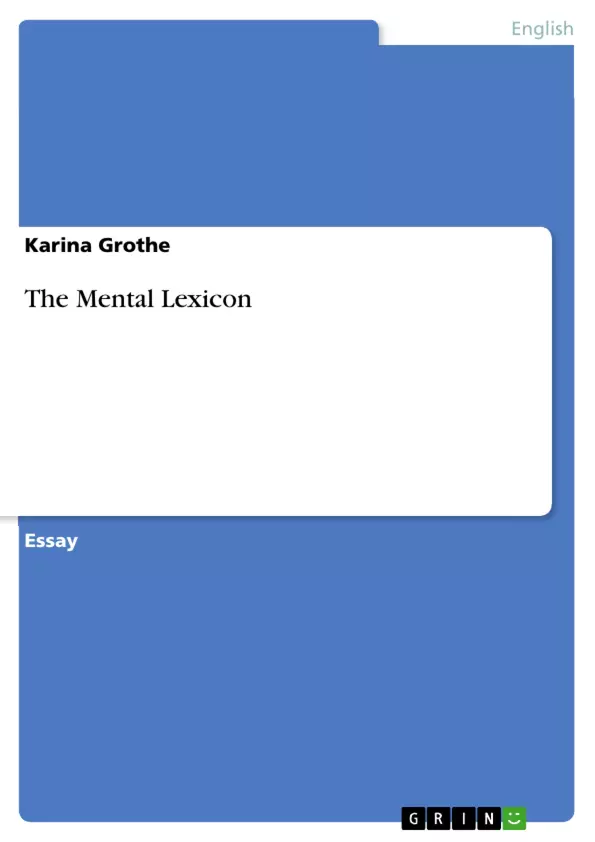Linguistics is the scientific study of the nature, variation, and structure of language, including the subfields of morphology, syntax, semantics, phonology, lexicology, and pragmatics. The mental lexicon is the language user’s mental dictionary, his knowledge about words and morphemes. Therefore, the mental lexicon is an area of research within the field of lexicology, since lexicology is the study of words, their history and their meaning. Not much is proven about how words are stored and organized in the brain, or how they are accessed, neither in speech production nor in speech perception. However, after having conducted linguistic experiments and having analyzed speech errors, linguists have set up several metaphors and models which can represent the possible structures and processes in the mental lexicon. These metaphors and their genesis will be presented and explained in this essay. Furthermore, although being an area of research within the field of lexicology, it will be shown that the mental lexicon is nevertheless intertwined with all the other subcategories of linguistics.
Table of Contents
- The Mental Lexicon
- Metaphors and Models of the Mental Lexicon
- The Dictionary Model
- The Birdcage Model
- The Library Model
- The Computer Model
- The Cohort Model
- Conclusions and Further Research
Objectives and Key Themes
This essay explores the mental lexicon, the cognitive structure where words and their meanings are stored and accessed. It delves into the organization and processes within the mental lexicon, drawing from linguistic experiments and analyses of speech errors. The essay aims to provide an overview of various metaphors and models proposed to represent the mental lexicon's structure and functionality.
- The organization of the mental lexicon
- Metaphors and models used to represent the mental lexicon
- The limitations of current models and metaphors
- The role of phonological, semantic, and grammatical factors in lexical access
- The implications of the mental lexicon for speech production and perception
Chapter Summaries
- The Mental Lexicon: This introductory chapter defines the mental lexicon and its significance within the field of lexicology. It highlights the speed and efficiency of word retrieval and recognition, suggesting a highly organized structure within the brain.
- Metaphors and Models of the Mental Lexicon: This section delves into various metaphors and models proposed to represent the organization and functionality of the mental lexicon. These models include the dictionary model, the birdcage model, the library model, and the computer model.
- The Dictionary Model: This chapter examines the traditional view of the mental lexicon as a dictionary-like structure, where words are stored alphabetically. It presents evidence from speech errors that contradicts this model, suggesting a more complex organization based on multiple factors.
- The Birdcage Model: This chapter introduces the birdcage model as a more flexible and dynamic representation of the mental lexicon, emphasizing the interconnectedness of various lexical categories.
- The Library Model: This section explores the library model, comparing words to books on shelves categorized by semantic, phonological, and situational aspects. It discusses the limitations of this model in explaining the variability of word retrieval speed.
- The Computer Model: This chapter examines the computer model, drawing parallels between the mental lexicon and computer software for storing and accessing vocabulary. It highlights the support for this model provided by the cohort model of lexical processing.
- The Cohort Model: This chapter focuses on the cohort model, a direct model of lexical processing that resembles the processes of using a dictionary software program. It explains how the model identifies the uniqueness point of a word based on its initial sound pattern.
Keywords
The key concepts explored in this essay include the mental lexicon, lexicology, metaphors, models, speech errors, phonology, semantics, morphology, grammar, lexical access, speech production, speech perception, cohort model, and the limitations of current models in fully explaining the complexity of the mental lexicon.
Frequently Asked Questions
What is the "Mental Lexicon"?
It is the language user's mental dictionary, containing all stored knowledge about words, morphemes, and their meanings.
Which models are used to describe word storage?
Linguists use metaphors like the Dictionary Model, the Birdcage Model, the Library Model, and the Computer Model.
What is the Cohort Model?
It is a model of lexical processing that explains how we identify words based on their initial sound patterns and uniqueness points.
How do speech errors help linguists?
Analyzing speech errors provides clues about how words are organized and accessed in the brain, often contradicting simple models.
Is the mental lexicon only about semantics?
No, it is intertwined with phonology, syntax, morphology, and pragmatics, involving complex grammatical and sound-based factors.
Why is word retrieval so fast?
The speed suggests a highly organized cognitive structure, though the exact biological storage mechanism is still being researched.
- Citation du texte
- Karina Grothe (Auteur), 2009, The Mental Lexicon, Munich, GRIN Verlag, https://www.grin.com/document/167624



